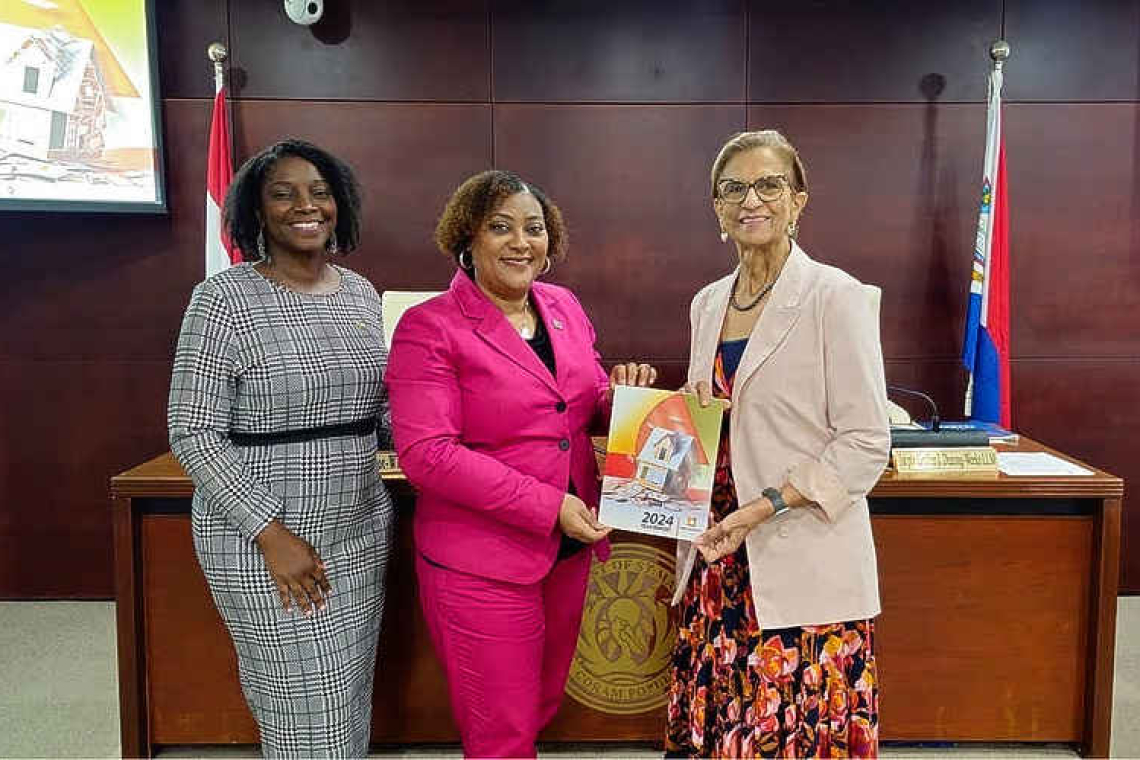Ombudsman Gwendolien Mossel (centre) presents the year report to President of Parliament Sarah WescotWilliams (right) while Legal Advisor Aishira Cicilia looks on at left.
PHILIPSBURG--Political instability, lack of resources, and poor responsiveness across government departments continue to hinder the delivery of public service, Ombudsman Gwendolien Mossel told Members of Parliament (MPs) on Thursday during the presentation of the Ombudsman’s 2024 Year Report at the House of Parliament.
Mossel said 2024 was a year of disruption for St Maarten, marked by two parliamentary elections – in January and August – which directly affected the Ombudsman’s ability to handle complaints and obtain responses from government.
She reported nearly 100 fewer complaints compared to 2023, attributing the decline to public reluctance to engage during times of governmental uncertainty.
“Many citizens hesitate to file complaints under interim governments, preferring instead to wait for a fully formed administration. For some, the political composition of the new government plays a role in their decision to come forward,” she added.
Mossel explained that instability affects not only the number of new complaints but also delays ongoing investigations. While government operations are expected to continue, “responses to the Ombudsman’s inquiries and requests often slow down or cease altogether – particularly within ministries that have historically been unresponsive,” she said.
The Ministry of Public Housing, Spatial Planning, Environment and Infrastructure (VROMI) once again topped the list for most complaints since 2019. “Complaints represent more than just documents; they embody real individuals facing genuine issues and concerns. Failing to respond constitutes a dis-service to the public,” Mossel said. She added that non-responses often point to “a deeper impotence rooted in a lack of resources.”
The Ombudsman said communication with VROMI had shown slight improvement following several meetings held between 2024 and 2025 and noted the recent appointment of a new complaint liaison.
Mossel also renewed her call for a clear policy on the allocation of domain land in compliance with the DIDAM Arrest. “It is essential that government adopt such a policy without delay, in line with good governance. The Ombudsman once again calls on Parliament to address this matter urgently, as it remains of great public interest,” she said. She advised the Ministry to issue a standard letter to persons awaiting domain land to explain the policy delay and implications of the court ruling.
On the Ministry of Justice, Mossel highlighted the backlog in processing residence permit applications and the absence of a functioning complaint procedure within the Police Force of St Maarten (KPSM). “Citizens often face difficulty navigating the process, and the newly established Complaints Handling Committee appears to be non-operational,” she said, adding that the KPSM’s online complaint platform remains inactive. Still, Mossel acknowledged the Police Force for timely responses in some cases resolved during the intervention stage.
She also cited a case involving an inmate at the Pointe Blanche House of Detention who waited more than two years for a court-ordered transfer to Bonaire for medical treatment. “Despite repeated efforts to have the case prioritized, the Minister failed to execute the verdict for more than two years. This delay violated the inmate’s fundamental rights,” Mossel said. She confirmed that the transfer has since taken place but stressed that “organisational or administrative issues cannot be used as an excuse for non-compliance.”
On the Constitutional Court, Mossel noted that no laws were submitted for review in 2024 and that its president passed away in January of that year. The Ombudsman urged the government to appoint a new president, a substitute member, and a court recorder “as soon as possible to avoid any delay in procedures when required.”
Legal Advisor Aishira Cicilia presented the complaint statistics, reporting that the Ombudsman handled a total of 270 complaints in 2024. Of these, 228 were general complaints handled through the Information Window and 42 required full investigation. Cicilia said most Information Window cases involved the Social and Health Insurance SZV, the Police Force (KPSM), the Tax Department, school boards, GEBE, and the Labour Office.
“Information Windows give a snapshot of the everyday questions, concerns and challenges the public is having with our institutions,” Cicilia said. Of the 42 cases that warranted further investigation, 37 involved ministries, with VROMI and Justice each recording nine. The Ministries of VSA, General Affairs, Education, and TEATT followed with four each, and Finance with three. She added that investigations involving Finance and TEATT were all resolved at the intervention stage, meaning complainants received responses early in the process.
Cicilia said a total of 48 cases were closed in 2024, including 25 new ones and 23 older cases dating back to 2020. At year’s end, 28 cases remained open. The most frequently violated standards of propriety were “adequate organisation of services,” “promptness,” and “active and adequate information provision.”
In total, the Ombudsman issued 96 recommendations aimed at improving government performance, transparency, and service delivery. “The Ombudsman strongly encourages all government entities to implement the issued recommendations, as these strengthen good governance, reduce recurring complaints, and foster greater accountability and public trust,” Cicilia said.
Mossel spoke of the importance of the Ombudsman’s role in strengthening democracy. “The Ombudsman is not only a defender of rights but also a pillar of democratic legitimacy,” she said. “The growing loss of trust in politics and public officials is one of the greatest challenges to modern democracy, underscoring the vital role of the Ombudsman and other oversight institutions.”
She also thanked former Secretary General Randolf Duggins for his ten years of service, commending his “infallible contribution” to the institution and wishing him success in his new role as Sint Maarten’s member of the Council of State of the Kingdom.







